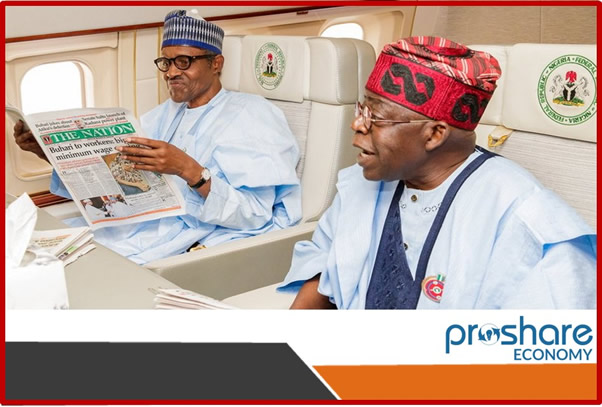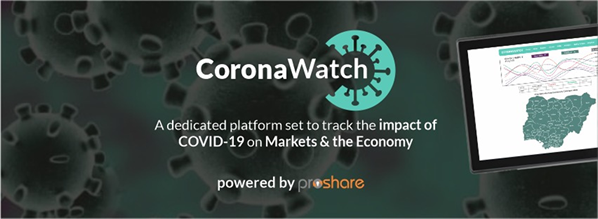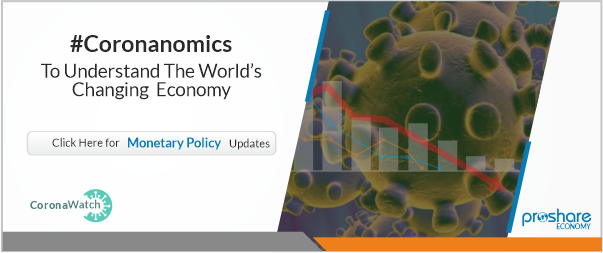Sunday, May03, 2020 10:23 PM / by Asiwaju Bola Ahmed Tinubu/ Header ImageCredit: PulseNG
Economic Policy
The economic fallout from the coronavirus may presentthe best, most pressing case for revising the CBN's high interest rate policy.The undue rates penalise domestic investment and consumer borrowing.
This reduces both aggregate domestic supply and, to alesser degree, aggregate domestic demand. The chronic gap between domesticsupply and demand has been filled by bloated levels of imports & encouragedan overvalued exchange rate that the high interests have helped produce.
In normal times, the high interest rates also attractsignificant foreign financial speculation, the ever-ominous hot money. While inthe short-term, the foreign speculation boosts financial inflows.
Over time, as compound interest payments become due onthese foreign investments, the nation will lose an ever-increasing amount ofmoney to satisfy foreign debt obligations. In the short run, high rates seem toattract foreign capital and spur the economy while giving it discipline againstinflation. In the longer-term, all of this is untrue. High rates give us theworst of both worlds.
They stifle domestic investment and incomes whilepushing up inflation and exposing an ever-increasing share of our financialsystem to foreign manipulation and dependence.
Put another way, if you take a single picture early inthe process, the high interest rate policy looks good at that moment in time.However, if you view the entire movie, you will see an ending that is bothpainful and unnecessary.
The Central Bank of Nigeria has demonstrated itsfinancial agility by establishing a growing number of special financingprograms for various industries and sectors of the economy. While theseprograms look good at first glance, they also expose important contradictions.
The special schemes are an implicit admission thatnormal rates stifle investment borrowing and thus suppress the economy. Theextraordinary schemes would not be required if the general interest rate was ata proper level.
By establishing the special programs, the CBN attemptsthe impossible. On one hand it defends the general rate as prudent. On theother, it proliferates special exceptions in order to spur investment borrowingthat the general rate has heretofore stifled.
By establishing the special programs, the CBN attemptsthe impossible. On one hand it defends the general rate as prudent. On theother, it proliferates special exceptions in order to spur investment borrowingthat the general rate has heretofore stifled.
This complex CBN rear-guard action does not serve thegreater purpose. It merely prolongs the inevitable: We must retreat from highinterest rates if we want investment borrowing to attain levels that actuallyincrease private-sector growth and job creation.
The modern global economy is built on credit.Prosperous nations have built success based on the sustained ability to usecredit to generate high levels of domestic investment as well as allow forsignificant consumer financing.
The Story Thus Far
The current form of our financial system isantithetical to growth. Broad and diffused growth was not the goal. Such growthcontravened the underlying tenet of military rule - tight, centralised controlof political power and economic resources.
There were no nodes of power truly independent fromthe centre. Nor did this situation foster creative and innovative economicthinking leading to sufficient business start-ups that might have grown anddiversified the economy.
Thus, the banking system became one intended to barmost businesses and people from access to sufficient commercial and consumercredit, a system constructed to suppress large-scale independent economicactivity unless expressly sanctioned and approved by arbitrary power.
As such, we are in a situation where the bankingsystem is not sufficiently governed by the rational dynamics of economicmaximization. Without optimal financial sector support, the productive economyhas failed to grow as it should.
A Dangerous Old Fallacy
Defenders of the high interest rate policy claim highinterest rates quell inflation and maintain sound exchange rates. Many localeconomists who remain wedded to a brand of conservative monetarism support thisposition.
Bola Ahmed Tinubu
However, that school of thought has been discreditedby the failures of Thatcherite policies of the UK in the 1980s, by monetarypolicies implemented to cure the 2008 financial crisis and by the financialpolicy moves being undertaken today to fight the coronavirus.
Long Term PositiveRelationship Between High Rates And Inflation
Over time, high rates cause more inflation than theyprevent. In the initial phase, high rates might lower inflation. Feedback loopscreated by the initial high rates will eventually encourage inflation.
Exchange Rate And TheEconomy
If we went to a freely floating exchange rate, thenaira would devalue. This means our currency is overvalued in terms of ourtrade with the outside world.
This overvalued exchange rate is buoyed by highinterest rates.
Coronavirus And TheOpportunity To Lower Interest Rates
Another consideration we must weigh regarding interestrates is how lowering rates along with other innovations may unlock thepotential for real estate to be catalyst for economic growth at this moment.
Conclusion
High interest rates are a fundamental drag on nationaleconomic growth. Only our unreliable power supply may loom as a biggerimpediment to national prosperity.
Lower rates will spur domestic investment andproduction. This creates both jobs and wealth. High rates serve only tosuppress these vital factors. Lower rates will have some negative short-termimpact on inflation and the exchange rate.
However, in a twist of irony, the economicdislocations caused by the coronavirus serve to mitigate those temporarynegative consequences. If there is a time to reduce interest rates, that timeis now.
Related News
1. Why It Is WorthListening to Bola Ahmed Tinubu On Sovereign Economics - Apr 10, 2019
2. Bola TinubuColloquium and Productive National Discourse - | The Guardian - Mar 29, 2019
3. The Bola Tinubu- Bukola Saraki Exchange for The Records - Aug 20, 2018
4. Seven Drivers ofUrgent Need to Fix The Economy - Bola Tinubu - Sept25, 2017
5. A New Nigeria Or A Better One:The Fitting Tools of a Great Repair - TheNews - Sept 24, 2017
6. Kachikwu:Competence based performance; not magic is required - Bola Tinubu - Mar27, 2016
7. The Story of aVisionless Caper: How Political Shenanigans Led to a Bond Default - Apr 04, 2019
Related Video
Power, Key to Driving Nigeria's Economy-Bola Tinubu - Oct 03, 2016
RELEVANT LINKS on Exchange Rate Policy and EconomicManagement in Nigeria
1. Foreign DirectInvestment and the Central Bank of Nigeria's Monetary Policy - Feb 16,2018; Bismarck Rewane, FDC
2. The NigerianEconomy: A Macro-econometric and Input-output Model - Sept 07,2016; by Dr. Temitope W Oshikoya
3. Why portfolioinvestors are not flocking to Naira-based assets - Businessday - CrescentPillars, Aug 15, 2016
4. NigerianEconomy: Beyond a Flexible Exchange Rate Policy
5. Why portfolio investors are not flocking toNaira-based assets - Aug 11, 2016
6. Resolving theExchange Rate Regime Conundrum
7. The Economist'sEvidence on Devaluations
8. MPC: Behind theCurve, Playing Catch Up
9. ManagingExchange Rate, Interest Rate, Capital Flows and Reserves - Book Abstract, May 13, 2016
10. Pathways toShared Prosperity in Nigeria: Making Market and Government Work in a GlobalContext - May 08, 2016; by Dr.Temitope W Oshikoya
11.The Art ofCentral Banking in Nigeria: Managing Exchange Rate, Interest Rate, CapitalFlows and Reserves - Amazon, April 27,2016; by Dr. Temitope W Oshikoya
12.Nigeria: OfMinisters, Clowns, Hazards, and Lazard - Apr 08, 2016
13.Current StateAnalysis of the Economy - Temitope Oshikoya
14.It's theProductivity, Stupid.
15.Currency Woes and Capital Flows in EmergingMarkets - Feb 04, 2016
16.Who Command and Control the Economy? - May 11, 2016
17.Current State Analysis of the Economy - Oct 16, 2015
18.JP Morgan Index and Collective Self-Delusion - Sept 16,2015
19.It's Productivity of the Economy that Defendsthe Naira - Jul 8, 2015
20.Emefiele's CBN: one year after - June 10, 2015
21. Exchange Rate Policy and Economic Management inNigeria - Is there a need for Paradigm Shift? - Proceedings of Seminar byCBN, April 2015
22.The Quadrilemma ofBuharinomics
23.Microeconomics ofBanking and High Lending Rates
24.Nextonomics puts costof Buhari's Economic Blueprint at N60 Trillion
Related News - Opinions & Analysis
1. Nigeria's PostCOVID-19 Economic Outlook - Ayo TERIBA
2. The ComingGreater Depression of the 2020s
3. Of Swans andFree Markets Capitalism - Lessons for Nigeria
4. Can the NigerianEconomy Survive the Virus?
5. Nigeria'sEconomy After Oil: How Should We Prepare? - Bode AGUSTO
6. Roadmap toRebooting Nigeria's Economy from COVID-19 - Soji APAMPA
7. Can AfricaAfford COVID-19 Lockdowns? - Chukwuma SOLUDO
8. Of Q1'20Economic Output and GDP Forecasts - Lessons from China
10. The World AfterCOVID-19: Mark CARNEY on How the Economy Must Yield to Human Values
11. What Would theWorld Look Like after Coronavirus: Economically, Politically and Socially? -MAK
Related News - Monetary Policy
1. Ahead of 040520WebTV Discussions on COVID-19: Assessing Fiscal and Monetary Policy Responseswith Laoye Jaiyeola, CEO NESG
2. Looking at Homefor Policies and Solutions
3. MPC MembersLooking Beyond the Virus
- CBN Intervention: Playing to the Gallery or Serious Business?
- Turning COVID-19 Tragedy into Opportunity for a New Nigeria
- Personal Statements By The MPC Members At The 129 MPC Meeting of Mar 23-24, 2020
- MPC - Think Twice or You Sink! FDC Aligns with TheAnalyst Opinion that the CBN is Trapped
- CBN Issues Guidelines for the Implementation of the N50bn Targeted Credit Facility
- CBN Communique No. 129 of the MPC Meeting - Mar 23-24, 2020
- The Limits of Heteredox Economics Revealed, MPC Trapped and Has to Hold
- Monetary Policy Preview - Caught Between the Devil and the Deep Blue Sea
- Fiscal or Monetary, Both, Neither?
- COVID-19: CBN, Bankers' Committee to Support Pharmaceutical Companies
- Bankers Committee Reviews Impact of COVID-19 On Economy, Announces Support Packages
- Coronanomics: Figuring Out CBN's Recent Policy Intervention
- CBN Policy Measures in Response to COVID-19 Outbreak and Spillovers
- Bank of England Measures to Respond to The Economic Shock from COVID-19
Related News - Nigeria Economy
1. The Lockdown -Food Scarcity and Social Unrest Looming
2. April 2020Headline Inflation Will Cross 13.0% - FDC
3. NigerianEconomic Update: A Throw of the Dice
4. Guidelines andRecommendations: Reopening the Nigerian Economy
5. GDP By Incomeand Expenditure Approach Q4 2019 - Household Final Consumption Declined by-2.40%
6. Of Swans andFree Markets Capitalism - Lessons for Nigeria
7. Hiccup in TradeActivities Ahead
8. Can the NigerianEconomy Survive the Virus?
9. A SurprisingBoost to the FAAC Payout; April Payment Amount to N781bn
10. Impact ofPrivatization on Nigeria's Economy
11. Can AfricaAfford COVID-19 Lockdowns? - Chukwuma Soludo
12. COVID-19;Nigeria Needs to Relax Foreign Exchange Management to Boost Industrialization -Dr. Yusuf
13. Nigeria'sEconomy After Oil: How Should We Prepare? - Bode Agusto
14. The DisruptiveImpact of COVID-19
15. Nigeria'sImpending Recession
16. CoronationWeekly: Interest Rate Conundrum
17. HeadlineInflation Increases By 12.26% YoY In March 2020; 0.06% Higher Than February2020 Rate
18. COVID-19 and theConstruction Sector
19. Consolation inIsolation: COVID-19 - Why You Are Unlikely to Die - LBS EBS - April 2020
20. Great LockdownNecessitates Further Downgrade to GDP
21. COVID-19 and theFocus on Sub-Nationals in Nigeria
22. Reset Nigeria -A New Paradigm for Africa's Most Populous Country
23. Decline in theFGN's External Debt Service
24. Ahead ofTomorrow on WebTV: COVID-19 Impact on Supply Chain and Disruptions on OperatingModel
Related News - Reviews & Outlook
- Nigeria's Post COVID-19 Economic Outlook - Ayo Teriba
- Fitch Revises 2 Nigerian Banks' National Ratings
- Banking System Outlook Update - Nigeria Outlook Changes to Negative Due to Oil Price Collapse
- Is Africa Open for Business?
- Coronavirus Crisis Impact on Jobs Could Outweigh GDP Impact
- Moody's Affirms Nigeria's B2 Ratings, Maintains Negative Outlook
- Fitch Revises Outlook on Kaduna State to Negative on Sovereign Rating Action; Affirms at 'B'
- Fitch Downgrades Lagos State to 'B' on Sovereign Rating Action; Outlook Negative
- Further Multi-Notch Sovereign Downgrades Are Probable in 2020
- Various Rating Actions On Nigerian Banks By S and P Following Sovereign Downgrade; Outlooks Stable
- Three Ratings Agencies, Now One Message
- Fitch Downgrades Nigeria to 'B'; Outlook Negative
- Nigerian Banks at Severe Risk from Oil Price Slump, Coronavirus
- Moody's Assigns Ratings to Dangote Cement Plc's DMTN Program and Proposed Series 1 Notes
- Macroeconomic Review Q1 2020: Steering a Fragile Economy in the Face of Uncertainties
- Fitch Downgrades 3 Nigerian Banks to 'B', Places All 10 Banks on Negative Watch
- Nigeria Long-Term Rating Lowered To ''B-'' On Weakening External Position
- Coronavirus to Weaken Sovereign Fiscal Positions; Track Record Matters
- Fiscal Space Limited for Many Sovereigns
- Rating Actions Taken on Several Corporate Issuers with Exposure To Nigeria

 Lagos, NG • GMT +1
Lagos, NG • GMT +1











 3028 views
3028 views


















 Sponsored Ad
Sponsored Ad
 Advertise with Us
Advertise with Us









